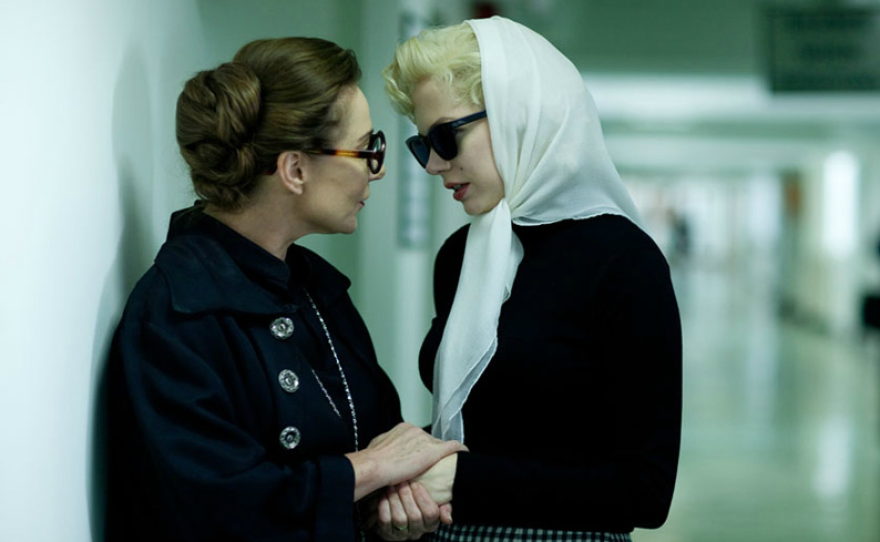Playing a famous celebrity is no easy task and Michelle Williams makes a valiant effort to bring Marilyn Monroe to life in "My Week With Marilyn" (opened December 2 at Landmark's La Jolla Village Theaters).
Getting a glimpse behind the scenes of Hollywood always has inherent interest. The U.S. has no monarch yet we tend to look to our Hollywood stars as royalty, and we crave to know more about their private lives. It's like sneaking a peak at the gossip rags at the grocery check out -- we may deny our interest in such sensationalism but there's always that desire to know more.
"My Week with Marilyn" gives us a behind the scenes look at the making of "The Prince and the Showgirl," a film that oddly paired Laurence Olivier with Marilyn Monroe. The new film "My Week with Marilyn" is taken from the memoirs of Colin Clark who, in 1956, was a 23-year-old third assistant director to Laurence Olivier and ended up spending some intimate time with Monroe, who felt out of her depth acting with Olivier on his home turf of London.
Producer Simon Curtis makes his directorial debut with this adaptation of Clark's book. The problem he faces is how do you make a film about people that are so well known? Do you try for mimicry and cast actors who look uncannily like the real celebrities they are playing? Or do you go for something deeper and try to capture the real essence of who these well known people were? Curtis' casting and directing of Michelle Williams as Monroe leans toward the former. There is a concerted effort to show us how much Williams can sometimes look like Marilyn. This is emphasized in the ads, the stills used in the credit sequences, and in much of the online marketing materials. And it's true, at times Williams can capture Monroe's look, but that's such a superficial part of the performance and Curtis makes us feel like Williams spends all her time posing just right for the camera to capture that Marilyn look.
But neither Curtis nor Williams is able to convey the magical contradiction that was Marilyn. She was both sweet and sexy, innocent and savvy, and both natural and calculating in her acting craft. She was also effervescent, incandescent, and simply irresistible on screen. Williams conveys only a wisp of that complexity and beguiling screen presence. Monroe is not easy to portray and Williams does a commendable job but it falls short of dazzling us or making us believe we're watching Monroe. Check out this trailer of "The Prince and the Showgirl" to jog your memory about just how special Marilyn was on screen.
I do have to say that my favorite screen incarnation of Monroe is the weird caricature done of her by Teresa Russell in "Insignificance." In the film she is referred to only as "The Actress" but she is made to look exactly like Monroe from "The Seven Year Itch." Russell plays the Monroe character broadly yet there is something undeniably charming about the performance that gets to more of what Monroe was really about. Maybe because Russell was so obviously playing the icon, she was somehow able to access a cinematic truth about what made Monroe so riveting on the screen.
While Curtis goes for mimicry with Monroe's character he seems unconcerned about anyone else looking even remotely like who they are playing. Kenneth Branagh plays Olivier, Julie Ormand is his wife Vivien Leigh, Judi Dench is Sybil Thorndike -- and none of them look or even act like the stars they are meant to be playing. Although Dench has a grand ole time as the cheery British actress Thorndike.
But where the film does succeed is in giving us an insight into what has always been a baffling film. "The Prince and the Showgirl" seemed as odd an onscreen pairing as it was off screen. The classically trained Olivier with the method actress Monroe; he a British institution, she an American pop icon; he schooled in Shakespeare; she a light comedienne. If you look back at the film, Olivier's performance seems painfully flat and dull while Monroe seems awkward and restrained. The film showed neither to their best advantage and the material was stiff and dull. But Curtis' "My Week with Marilyn" explains what was going on behind the scenes so that the 1957 film makes more sense. Olivier wanted to rekindle youth in himself by playing opposite Monroe, and, according to Clark's version of things, he readily recognizes how this failed and how he ended up looking dead onscreen. The film also provides some insight into Monroe's approach to acting and her insecurities.
"My Week with Marilyn" (rated R for some language) is an intriguing behind the scenes look at the 1957 film "The Prince and the Showgirl."
Companion viewing: "The Prince and the Showgirl," "Insignificance," "Some Like It Hot"







